
Lab-made Food? How science literacy helps us to understand food tech with Chana Davis, PhD
12/01/20 • 32 min
Food made in a lab using microbes? It's happening now! New tech can be scary and none of us are immune to being mislead or adopting a belief based on misinformation.
In this episode Chana Davis, PhD and I discuss new and exciting food technology using microbes, and how improving scientific literacy can help to shape the conversation around food technology!
We talk about:
- How Chana got involved in science communication
- What is a critical thinking mindset? How do you get one?
- How to find credible sources of information?
- What are the limitations of science?
- Why science isn’t perfect
- How can we ‘pressure test’ the news?
- What is ‘food tech’?
- How do microbes help us in making food and food ingredients?
- What’s the future of our food?
- Plant based diets and the movement towards new food technology for sustainability and increasing options for different dietary patterns
- Why food technology isn’t something to be afraid of
- Molecular diagnostics – what is it?
To learn more about Chana, here are her social links!
Website & Newsletter: https://fueledbyscience.com/
Food made in a lab using microbes? It's happening now! New tech can be scary and none of us are immune to being mislead or adopting a belief based on misinformation.
In this episode Chana Davis, PhD and I discuss new and exciting food technology using microbes, and how improving scientific literacy can help to shape the conversation around food technology!
We talk about:
- How Chana got involved in science communication
- What is a critical thinking mindset? How do you get one?
- How to find credible sources of information?
- What are the limitations of science?
- Why science isn’t perfect
- How can we ‘pressure test’ the news?
- What is ‘food tech’?
- How do microbes help us in making food and food ingredients?
- What’s the future of our food?
- Plant based diets and the movement towards new food technology for sustainability and increasing options for different dietary patterns
- Why food technology isn’t something to be afraid of
- Molecular diagnostics – what is it?
To learn more about Chana, here are her social links!
Website & Newsletter: https://fueledbyscience.com/
Previous Episode

What Does Your Microbiome Say About You? with Colin Hill, Ph.D
In this episode of Let's Gut Real, I interview Colin Hill Ph.D on how our microbiome develops, the role it plays in our health, current research limitations and mistakes we make when looking at the gut microbiome, and things we can get excited about for future research.
Colin Hill has a Ph.D in molecular microbiology and is Professor of Microbiology at University College Cork, Ireland. His main interests are in infectious disease, particularly in the role of the gut microbiome in protecting against microbial infections. He is also a Principal Investigator in APC Microbiome Ireland in Cork, a large Science Foundation Ireland supported research centre working with industry devoted to the study of the role of the gut microbiota in health and disease. In 2005 Prof. Hill was awarded a Doctor of Science by the National University of Ireland in recognition of his contributions to research. In 2009 he was elected to the Royal Irish Academy and in 2010 he received the Metchnikoff Prize in Microbiology and was elected to the American Academy of Microbiology. More than 75 students have done their PhD’s in his laboratory. He has published more than 550 papers and holds 25 patents.
We talk about
- The evolution of humans and microbes
- Why you ‘get the microbiome you deserve’
- How will we define a healthy microbiome, what are the limitations?
- Thoughts on commercial kits – can we really interpret them in individual care?
- Getting back to what Mother Nature has given us as a form of drug therapy by way of using microbes and microbial chemicals to treat disease
To learn more about Colin Hill, see his research at University College Cork or follow him on Twitter
Next Episode

Masqueraders of IBS with Kate Scarlata, RD
What are some conditions that look a lot like irritable bowel syndrome? Kate explores conditions that can masquerade as IBS and often lead to prolonged digestive symptoms!
Kate Scarlata, MPH, RDN, LDN is a Boston-based dietitian with 30 years of experience. Kate’s expertise is in gastrointestinal disorders and food intolerance, with a particular focus on the application of the low FODMAP diet for functional gut disorders. She was awarded the Outstanding Massachusetts Dietitian Award and recognized as Boston’s Best Dietitian by Boston Magazine. Kate is the author of numerous books and articles on digestive health topics including the New York Times Best Seller, The 21 Day Tummy Diet. Her latest book is The Low FODMAP Diet Step by Step. Kate completed her postgraduate training at Brigham and Women’s Hospital, a Harvard Medical School teaching affiliate.
Kate and I talked about the conditions typically on the radar which include:
- Inflammatory bowel disease
- Celiac disease
- Colorectal Cancer
- Microscopic Colitis
And then we get into conditions not typically on the radar, which include:
- GI infections
- Mast cell activation syndrome
- Milk protein intolerance
- SIBO
- Sucrase isomaltase deficiency (CSID)
And also discuss the importance of recognizing that IBS is a very real condition that has several excellent management options too!
If you don’t already follow Kate, you should she is on Instagram @katescarlata and on Twitter @KateScarlata_RD: and can learn more at katescarlata.com
If you like this episode you’ll love
Episode Comments
Generate a badge
Get a badge for your website that links back to this episode
<a href="https://goodpods.com/podcasts/lets-gut-real-easy-to-digest-nutrition-science-199725/lab-made-food-how-science-literacy-helps-us-to-understand-food-tech-wi-19923108"> <img src="https://storage.googleapis.com/goodpods-images-bucket/badges/generic-badge-1.svg" alt="listen to lab-made food? how science literacy helps us to understand food tech with chana davis, phd on goodpods" style="width: 225px" /> </a>
Copy




